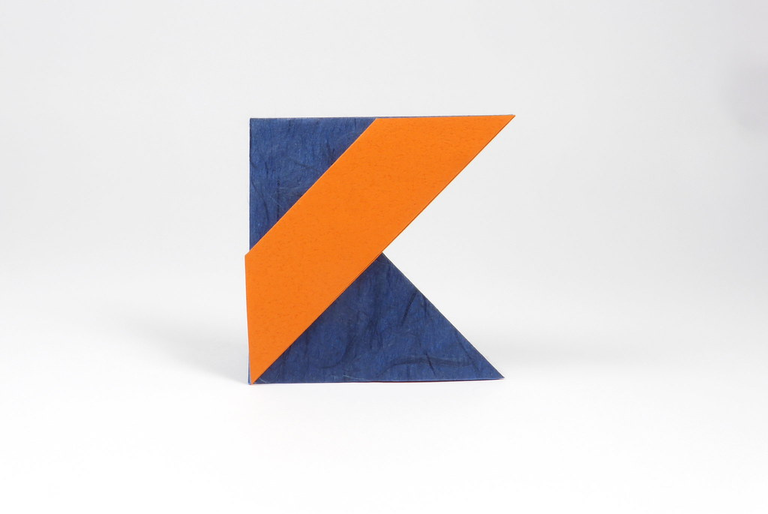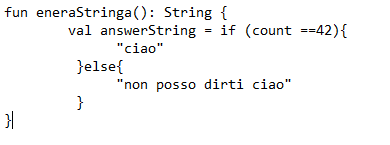
(immagine creative commonds)
Kotlin è un il linguaggio consigliato da Google per lo sviluppo di applicazioni Android. Si può utilizzare per creare applicazioni, siti e anche giochi, inoltre cosa fondamentale Viene garantita l'interoperabilità con Java al 100%.
In kotlin abbiamo 2 tipi di variabili:
-val quando la variabile è statica e quindi non si può modificare.
-var invece quando è dinamica e può essere sempre modificata.
possiamo anche evitare di inserire il tipo di variabile, come ad esempio: string,int,boolean, poiché sviluppato in modo da percepire da solo il tipo di variabile.

In questo caso Kotlin capirà che quella variabile sarà di tipo stringa.
All'interno di kotlin esistono 2 tipi di liste, che sono praticamente degli array ed hanno il compito di contenere dati, anche in base alle esigenze del programmatore.
Il modo classico di rappresentarle è la MutableList:
val nomeLista : MutableList<String>=mutableListOf()
nomelista.add("ciao")
In questo caso abbiamo creato una lista chiamata nomeLista, che può contenere solo dati di tipo stringa e abbiamo aggiunto a quella lista la parola ciao.
Le variabili in Kotlin non possono contenere valori null in modo predefinito, ma possiamo aggiungere noi l'opzione di contenere valori null aggiungendo il «?» dopo il tipo...ovviamente come ci sarete già arrivati, se inseriamo il punto interrogativo, non avrà più effetto la deduzione.

Queste funzioni hanno lo stesso comportamento delle condizioni classiche dei normali linguaggi di programmazione, ma permette anche di inserire codice condizionali a destra di un’assegnazione, Ad esempio Una cascata di if-else è sostituibile, inoltre, con un when.
In kotlin con la parola **fun **si possono dichiarare delle funzioni come anche in java o c. Il tipo di ritorno di quella funzione si esprime dopo il passaggio dei parametri, seguito dal simbolo «:»

In kotlin si può effettuare un passaggio fra una Activity ed un’altra, ma isogna prima effettuare delle modifiche...bisogna innanzitutto dichiarare un Intent, passando come parametri l’activity di partenza e l’activity di destinazione, per poi utilizzare il comando startActivity:
val myIntent = Intent(this, OtherActivity::class.java)startActivity(myIntent)
In kotlin si possono inserire anche dei dialogfragment,che sono delle finestre che appaiono sullo schermo in rispetto al resto dello schermo. Tutto il resto dello schermo si vede più opaco e cliccando all’esterno si elimina.
Troviamo altri componenti, come ad esempio le ListView:
Una ListView permette di visualizzare delle stringhe in un elenco.
Per crearle si utilizza il componente ListView insieme ad un oggetto layout di tipo TextView.
Creato il layout , si può utilizare anche un adattatore, che ha lo scopo di rendere a tutto lo schermo la nostra schermata, anche avendo dimensioni diverse... si utilizza il comando ArrayAdapte) che associ a ogni elemento della lista la riga «single_row».

Kotlin ha una marea di questi oggetti, possiamo trovare anche degli switch, delle date, tabelle ,addirittura dei campi di testo consigliati, se vi può interessare il prossimo post lo dedicherò per spiegarvi i vari oggetti che kotlin vi mette a disposizione.

(creative commons image)
Kotlin is a language recommended by Google for developing Android applications. It can be used to create applications, sites and even games, and a fundamental thing is 100% interoperability with Java.
In kotlin we have 2 types of variables:
-val when the variable is static and therefore cannot be modified.
-var instead when it is dynamic and can always be modified.
we can also avoid entering the type of variable, such as: string,int,boolean, since it is developed to perceive the type of variable by itself.

In this case Kotlin will understand that that variable will be of type string.
Within kotlin there are 2 types of lists, which are practically arrays and have the task of containing data, also according to the needs of the programmer.
The classic way to represent them is the MutableList:
val listName : MutableList<String>=mutableListOf()
listname.add("hello")
In this case we have created a list called listName, which can only contain data of type string, and we have added the word hello to that list.
Variables in Kotlin cannot contain null values by default, but we can add the option to contain null values ourselves by adding the «?» after the type... obviously as you will have already arrived there, if we insert the question mark, the deduction will no longer have effect.

These functions have the same behavior as the classic conditions of normal programming languages, but it also allows you to insert conditional code to the right of an assignment. For example, an if-else cascade can also be replaced with a when.
In kotlin with the word **fun ** you can declare functions as well as in java or c. The return type of that function is expressed after passing the parameters, followed by the symbol «:»

In kotlin you can switch between one Activity and another, but you must first make some changes... first of all you need to declare an Intent, passing the starting activity and the destination activity as parameters, and then using the command startActivity:
val myIntent = Intent(this, OtherActivity::class.java)startActivity(myIntent)
In kotlin you can also insert dialogfragments, which are windows that appear on the screen in relation to the rest of the screen. All the rest of the screen appears more opaque and clicking outside eliminates it.
We find other components, such as the ListView:
A ListView allows you to view strings in a list.
To create them you use the ListView component together with a layout object of type TextView.
Once the layout has been created, an adapter can also be used, which has the purpose of making our screen the whole screen, even if it has different dimensions ... the ArrayAdapte command is used which associates the «single_row» line to each element of the list .

Kotlin has a lot of these objects, we can also find switches, dates, tables, even recommended text fields, if you are interested in the next post I will dedicate it to explaining the various objects that kotlin makes available to you.
@tipu curate
Upvoted 👌 (Mana: 45/55) Liquid rewards.
Congratulations @fraaaaa! You have completed the following achievement on the Hive blockchain And have been rewarded with New badge(s)
Your next payout target is 100 HP.
The unit is Hive Power equivalent because post and comment rewards can be split into HP and HBD
You can view your badges on your board and compare yourself to others in the Ranking
If you no longer want to receive notifications, reply to this comment with the word
STOPTo support your work, I also upvoted your post!
Check out the last post from @hivebuzz:
Support the HiveBuzz project. Vote for our proposal!
Interessante come sempre e non conoscevo questo linguaggio!
!PGM
!PIZZA
!discovery 20
BUY AND STAKE THE PGM TO SEND A LOT OF TOKENS!
The tokens that the command sends are: 0.1 PGM-0.1 LVL-0.1 THGAMING-0.05 DEC-15 SBT-1 STARBITS-[0.00000001 BTC (SWAP.BTC) only if you have 2500 PGM in stake or more ]
5000 PGM IN STAKE = 2x rewards!
Discord
Support the curation account @ pgm-curator with a delegation 10 HP - 50 HP - 100 HP - 500 HP - 1000 HP
Get potential votes from @ pgm-curator by paying in PGM, here is a guide
I'm a bot, if you want a hand ask @ zottone444
un linguaggio molto carino, anche facile da usare, grazie del tuo commento:))
I gifted $PIZZA slices here:
(3/10) @libertycrypto27 tipped @fraaaaa (x1)
Send $PIZZA tips in Discord via tip.cc!